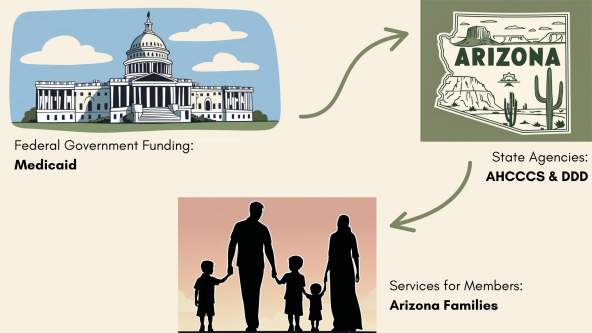How Medicaid Helps Fund Autism Services in Arizona

Navigating the world of autism services can be challenging for families, especially when it comes to understanding how these services are funded. In Arizona, Medicaid plays a crucial role in providing support for individuals with Autism Spectrum Disorder (ASD). This blog aims to explain the importance of Medicaid funding in Arizona, and how it supports critical therapies and care services for members of the autism community.
What is Medicaid?
Many people think of Medicaid as government-funded health insurance for low-income individuals and families. However, what is not well known is that Medicaid is also a key funding source for many autism services, which includes middle class families that would not otherwise qualify. In fact, state and federal Medicaid funds provide over 75% of all services for individuals with intellectual and developmental disabilities nationwide (https://thearc.org/policy-advocacy/medicaid/). Without Medicaid, care options for individuals with autism would be extremely limited.
Medicaid Programs in Arizona
Arizona’s Medicaid program includes a wide range of resources and services that are supported through a combination of state and federal funds. In general, the federal government provides about 65-70% of the funding needed for these services, and the state contributes the rest. Without that federal Medicaid contribution, the state would not be able to afford these services.
Medicaid in Arizona funds autism services through several key programs, including:
- Arizona Health Care Cost Containment System (AHCCCS)
This is Arizona's Medicaid program, which includes a wide range of care and services for individuals with ASD. Eligibility is based on income and/or qualifying disabilities. When members have their own separate private insurance, Medicaid becomes the “payer of last resort,” which can help families afford co-pays and deductibles for high-cost medical and treatment needs. AHCCCS programs are divided into two major categories – acute vs. long-term care. (azahcccs.gov)
- Arizona Long Term Care System (ALTCS)
ALTCS provides long-term care services to individuals with developmental disabilities, including autism. Unlike the acute care plans in AHCCCS, eligibility for long-term care is based on the individual’s needs only, rather than family income. (azahcccs.gov/Members/GetCovered/Categories/nursinghome.html)
- Division of Developmental Disabilities (DDD)
This program operates under the Arizona Department of Economic Security (DES) and provides services to qualifying individuals with developmental disabilities. Individuals with an ASD diagnosis may be eligible for DDD services if they meet all required qualifying critiera, which varies by age. (des.az.gov/ddd)
Specific Autism Services Funded by Medicaid
In Arizona, individuals with autism may receive many critical therapies and services through AHCCCS, ALTCS and DDD, which all rely on funding through Medicaid (https://www.azahcccs.gov/shared/asd.html). For children and youth, these services may include:
- Applied Behavior Analysis (ABA) Therapy: ABA therapy is a widely recognized treatment for autism that focuses on improving specific behaviors, such as social interactions, communication, and self-help. It is often considered the gold standard for autism treatment.
- Speech Therapy: Speech therapy helps individuals with autism improve their communication skills, both verbal and non-verbal. This therapy is essential for enhancing social interactions and overall communication.
- Occupational Therapy: Occupational therapy assists individuals with autism in developing daily living skills, such as dressing, eating, and personal hygiene. It also helps improve fine motor skills and sensory processing.
- Physical Therapy: Physical therapy focuses on improving gross motor skills, coordination, and physical capabilities. It can be particularly beneficial for individuals with autism who have difficulties with movement and balance.
- Habilitation: Habilitation services are designed to help individuals with autism develop skills necessary for daily living and independence. These services can include training in social skills, self-care, and community integration.
- Respite: Respite care provides temporary relief to caregivers by offering short-term care for children with autism. This service is crucial for preventing caregiver burnout and ensuring families have the support they need.
- Attendant Care: Attendant care services provide assistance with daily living activities, such as bathing, dressing, and meal preparation. These services help individuals with autism maintain their independence and improve their quality of life.
These are only a few examples of critical services that rely on Medicaid funding. There are many more programs and healthcare services for children, teens and adults that are provided through Arizona systems such as AHCCCS or DDD, but ultimately would not be possible without federal Medicaid funding.
The Impact of Medicaid Funding for the Autism Community
Medicaid funding is essential for ensuring that individuals with autism in Arizona receive comprehensive care. Nationally, about 1 in 31 children are estimated to have ASD, and many individuals and families rely on state Medicaid programs for their healthcare needs. In Arizona, programs like AHCCCS and DDD are instrumental in providing these critical services and supports.
Without Medicaid funding, many families would struggle to afford the specialized care and resources their children need. Medicaid helps bridge the gap, making it possible for families to access early intervention, long-term care, and developmental therapies and services.
Medicaid funding is a lifeline for families with children diagnosed with autism in Arizona. By supporting programs like AHCCCS, ALTCS, and DDD, Medicaid ensures that these children receive the care and resources they need to thrive. Understanding the importance of Medicaid funding can help families navigate Arizona’s systems of care and to advocate for continued support.
If you have any questions or need further information, feel free to contact our Family Support Team.


